ValueError: too many values to unpack (expected 2) in Python
Last updated: Apr 8, 2024
Reading time·4 min

# ValueError: too many values to unpack (expected 2) in Python
The Python "ValueError: too many values to unpack (expected 2) in Python" occurs when the number of variables in the assignment is not the same as the number of values in the iterable.
To solve the error, declare exactly as many variables as there are items in the iterable.

Here is an example of how the error occurs.
# ⛔️ ValueError: too many values to unpack (expected 2) a, b = ['apple', 'banana', 'kiwi']
# Declare exactly as many variables as there are items in the iterable
To solve the error, make sure to declare exactly as many variables as there are items in the iterable.
a, b, k = ['apple', 'banana', 'kiwi'] print(a) # 👉️ 'apple' print(b) # 👉️ 'banana' print(k) # 👉️ 'kiwi'
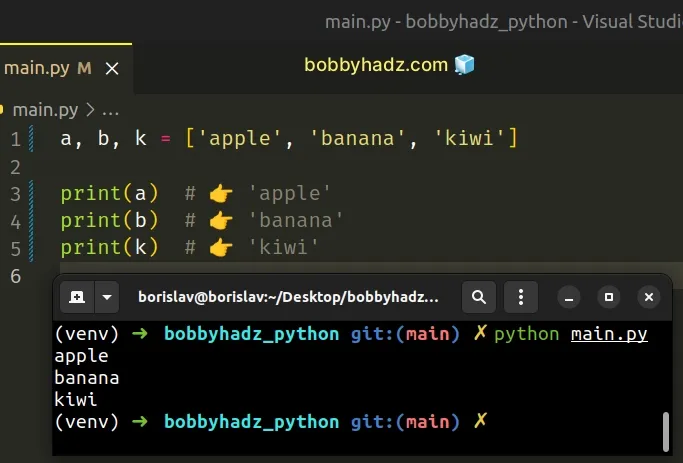
We declared 3 variables and the list contains 3 values, so everything works as expected.
Similarly, if the list has 2 items, declare 2 variables.
a, b = ['apple', 'banana'] print(a) # 👉️ 'apple' print(b) # 👉️ 'banana'
If you don't need to use one or more of the values, use an underscore as a placeholder.
a, b, _ = ['one', 'two', 'three'] print(a) # 👉️ one print(b) # 👉️ two
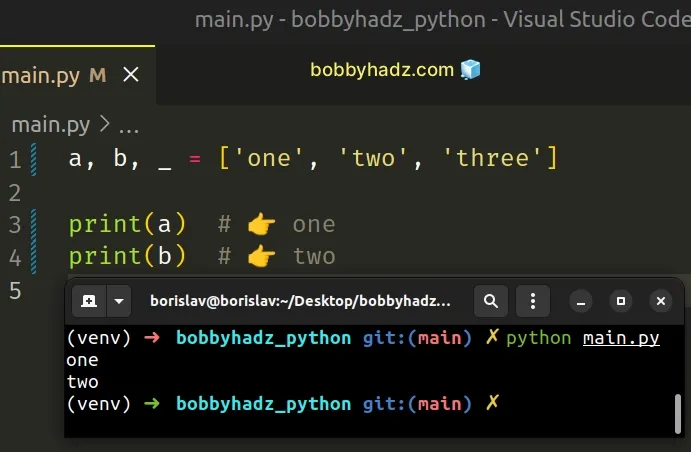
The underscore has no special meaning. It is used as a throwaway variable and signals to the reader of your code that the value isn't needed.
You can use as many underscores as necessary when unpacking.
a, _, c, _ = ['one', 'two', 'three', 'four'] print(a) # 👉️ one print(c) # 👉️ three
# Use the items() method to iterate over a dictionary
The error is often caused when trying to iterate over a dictionary without using
the items() method.
my_dict = {'name': 'Bobby Hadz', 'age': 29} # ⛔️ ValueError: too many values to unpack (expected 2) for key, value in my_dict: print(key, value)
When we use a for loop to iterate over a dictionary, we only get access to the
key.
my_dict = {'name': 'Bobby Hadz', 'age': 29} for key in my_dict: # name Bobby Hadz # age 29 print(key, my_dict[key])
We can use the dict.items() method to iterate over a dictionary with access to
the keys and values.
my_dict = {'name': 'Bobby Hadz', 'age': 29} for key, value in my_dict.items(): print(key, value) # 👉️ name Bobby Hadz, age 29
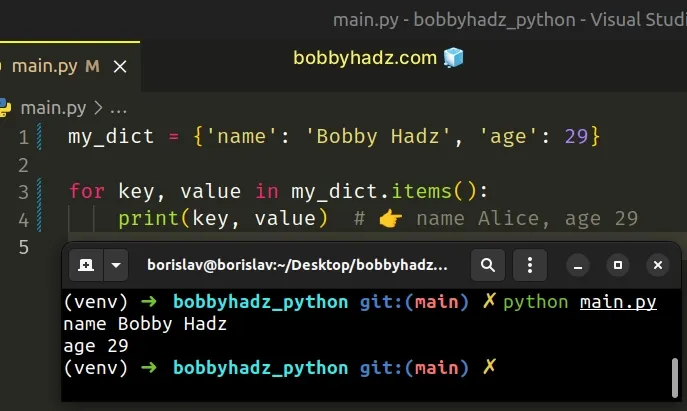
The dict.items() method returns a new view of the dictionary's items ((key, value) pairs).
my_dict = {'name': 'Bobby Hadz', 'age': 29} # 👇️ dict_items([('name', 'Bobby Hadz'), ('age', 29)]) print(my_dict.items())
The first element in each tuple is the key and the second is the value.
# Iterating over a list or tuple with access to the index
You might also get the error when trying to iterate over a list or a tuple with the index.
my_list = ['apple', 'banana', 'melon'] # ⛔️ ValueError: too many values to unpack (expected 2) for index, item in my_list: print(index, item)
When iterating over a list with a for loop, we only get access to the item of
the current iteration.
You can use the enumerate function to iterate over a list or tuple with the
index.
my_list = ['apple', 'banana', 'melon'] for index, item in enumerate(my_list): print(index, item) # 👉️ 0 apple, 1 banana, 2 melon
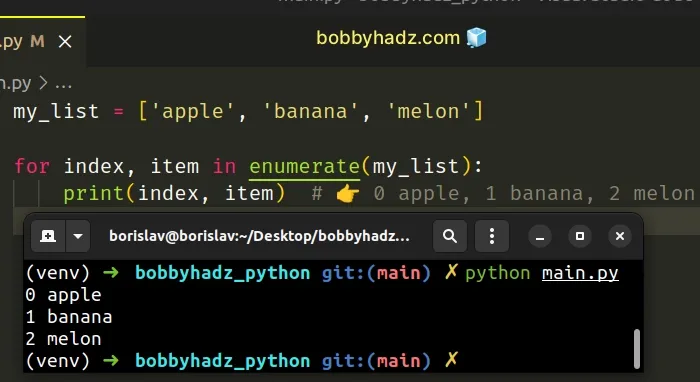
The enumerate function takes an iterable and returns an enumerate object containing tuples where the first element is the index and the second is the item.
# Unpacking the items of a function's return value
The error also occurs when we try to unpack the items of a function's return value.
def get_tuple(): return ('apple', 'banana', 'kiwi') # ⛔️ ValueError: too many values to unpack (expected 2) a, b = get_tuple()
The tuple contains 3 elements, but we only declared 2 variables.
Make sure to declare exactly as many variables as there are items in the iterable that the function returns.
def get_tuple(): return ('apple', 'banana', 'kiwi') a, b, k = get_tuple() print(a) # 👉️ 'apple' print(b) # 👉️ 'banana' print(k) # 👉️ 'kiwi'
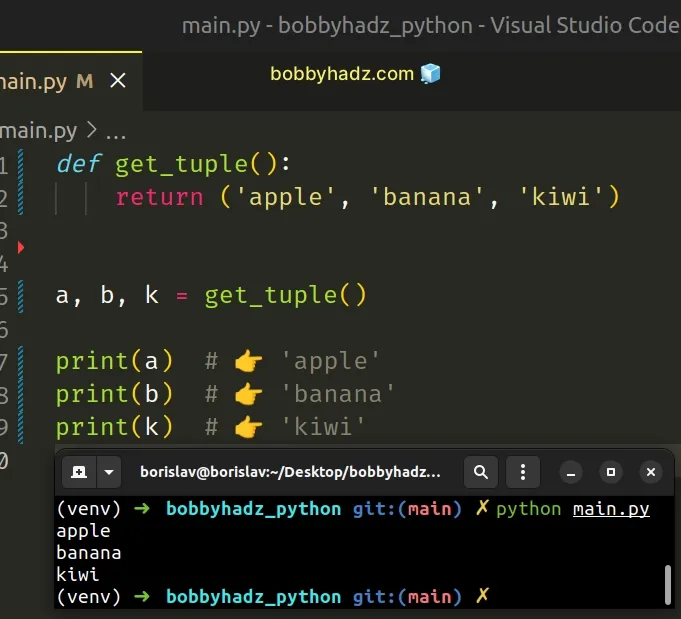
The function returns a tuple containing 3 elements, so we have to declare exactly 3 variables.
# Unpacking values from a string
The error is also caused when we try to unpack values from a string.
my_str = 'apple,banana' # ⛔️ ValueError: too many values to unpack (expected 2) a, b = my_str
When unpacking from a string, each variable declaration counts for a single character.
a, b, c = 'xyz' print(a) # 👉️ x print(b) # 👉️ y print(c) # 👉️ z
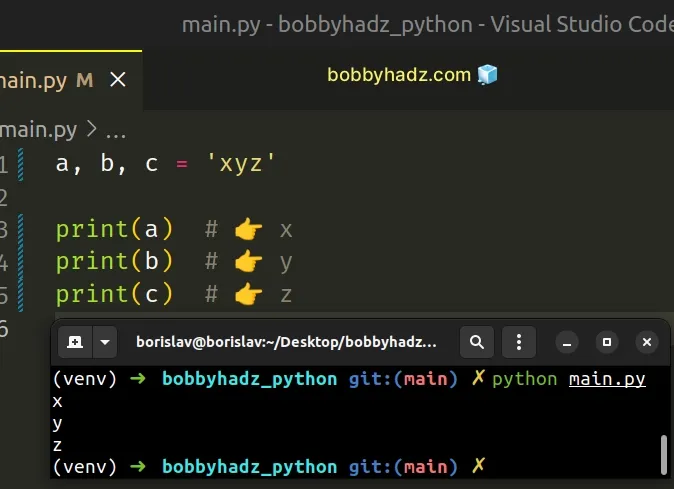
To solve the error, we have to split the string on the comma before unpacking the values.
my_list = 'apple,banana'.split(',') print(my_list) # 👉️ ['apple', 'banana'] a, b = my_list print(a) # 👉️ 'apple' print(b) # 👉️ 'banana'
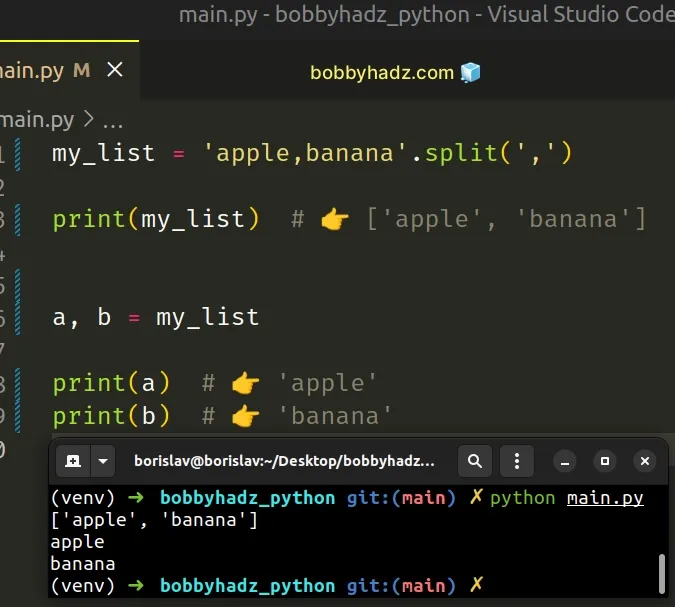
The str.split() method splits the string into a list of substrings using a delimiter.
The method takes the following 2 parameters:
| Name | Description |
|---|---|
separator | Split the string into substrings on each occurrence of the separator |
maxsplit | At most maxsplit splits are done (optional) |
str.split() method, it splits the input string on one or more whitespace characters.print('bobby,hadz'.split(',')) # 👉️ ['bobby', 'hadz'] print('bobby_hadz'.split('_')) # 👉️ ['bobby', 'hadz'] print('bobby hadz'.split(' ')) # 👉️ ['bobby', 'hadz']
If you meant to unpack specific characters into variables, make sure to declare exactly as many variables as there are characters in the string.
my_str = 'hi' h, i = my_str print(h) # 👉️ 'h' print(i) # 👉️ 'i'
I've also written an article on how to access multiple elements in a list by their indices.
# Additional Resources
You can learn more about the related topics by checking out the following tutorials:
- TypeError: cannot unpack non-iterable 'X' object in Python
- How to append multiple Values to a List in Python
- Check if multiple Keys exist in a Dictionary in Python
- Check if multiple Strings exist in another String in Python
- Check if multiple Values are in a List in Python
- Check if multiple variables are equal in Python

